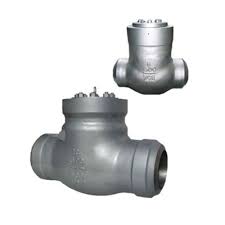Middleeast is the top most and well know Pressure seal check valve supplier in Kwait
A pressure seal check valve is a type of check valve that uses a pressure seal to prevent backflow. The valve features a pressure-assisted seal that is designed to close tightly against the valve seat, preventing backflow and ensuring a tight seal. These valves are typically used in high-pressure and high-temperature applications, such as power plants and chemical processing plants. They are also commonly used in pipelines and other fluid systems where a tight seal is required to prevent leakage.
Middleeast is the largest and fast-growing Pressure seal check valve supplier in Kwait. While manufacturing, we keep in mind the industrial standards and maintain the quality standards of the valves.
- Parts
- Body
- Disc
- Seat
- Hinge
- Spring
- Cover
- Yoke
- Pressure Seal
- Advantages
- These valves are designed to withstand high pressure and temperature conditions, making them ideal for use in power plants, chemical processing plants, and other high-pressure applications.
- The pressure-assisted seal on these valves provides a tight seal against the valve seat, preventing backflow and ensuring that there is no leakage.
- These valves have relatively simple designs, with few internal moving parts, which makes them relatively easy to maintain and repair.
- They are typically made of high-quality materials such as stainless steel or alloy, which makes them durable and resistant to wear and tear.
- These valves typically have a compact design, which allows them to be easily installed in pipelines and other fluid systems.
- These valves are known for their reliability, as they are designed to operate with a high degree of accuracy and repeatability.
- The pressure seal design allows for low opening and closing torque, reducing the stress on the actuator.
- They can be actuated by a simple pneumatic or hydraulic actuator, making them easy to control and automate.
- Due to the pressure seal design, these valves typically have a longer life span than traditional check valves.
- Industries which use them
- Power Generation Plants
- Oil and Gas Industry
- Chemical Processing Industry
- Pharmaceutical Industry
- Paper and Pulp Industry
- Food and Beverage Industry
- Marine Industry
- Applications
- These valves are used to control the flow of steam in power plants, industrial boilers, and other high-pressure steam systems.
- These valves are used to control the flow of water in pipelines, treatment plants, and other water systems.
- They are used to control the flow of crude oil, natural gas, and other fluids in pipelines and processing plants.
- These valves are used to control the flow of corrosive and hazardous chemicals in chemical processing plants.
- These valves are used to control the flow of liquids and gases in sterile environments in pharmaceutical manufacturing.
- They are used to control the flow of fluids in waste water treatment plants.
- These valves are used to control the flow of feedwater in boilers, and other high-pressure systems.
- Pressure seal check valves are used to control the flow of water in fire protection systems.
- These valves are used to control the flow of compressed air in pneumatic systems.
Description-
Available materials: Cast iron, Ductile iron, WCB, LCC, CF8M, SS304, SS316, SS316L, ASTM A105N, ASTM A182Gr-F304, ASTM A182Gr-F316
- Class: 150 to 2500
- Nominal Pressure: PN10 to PN450
- Size: 1/2” to 40”
- Ends: Flanged, Wafer, lug, Threaded, Buttweld, Socketweld
Visit us: https://www.middleeastvalve.com/product/pressure-seal-check-valve/
0
0







